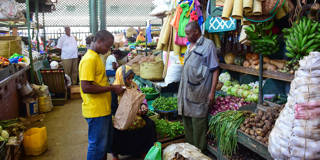New evidence from two Kenyan counties shows that cash transfers and other income supplements reduce hunger, illness, and risk exposure during crises. Countries should consider building transfer systems that can be activated at short notice to help people weather unanticipated shocks.
NAIROBI – When the COVID-19 pandemic and the resulting recession pushed 120 million people worldwide into extreme poverty in 2020, many countries relied on social-protection measures to cushion the blow. By May 2021, a total of 3,333 such schemes had been planned or implemented in 222 countries or territories.
Because the world will face other crises in the coming decades, we must learn how to protect people better against unexpected events – particularly as the effects of climate change become more pronounced and leave many exposed to natural disasters and income shocks. But how?
Social-protection programs that assist low-income families, insure against shocks, and break poverty traps offer a potential solution. But targeted cash transfers, the most prevalent scheme, might not address supply-side barriers such as shortages of food and other essential goods, particularly during crises. So, can any type of cash transfers mitigate the impact of large shocks? Do crises require new social-protection measures, or can existing policies boost resilience?

NAIROBI – When the COVID-19 pandemic and the resulting recession pushed 120 million people worldwide into extreme poverty in 2020, many countries relied on social-protection measures to cushion the blow. By May 2021, a total of 3,333 such schemes had been planned or implemented in 222 countries or territories.
Because the world will face other crises in the coming decades, we must learn how to protect people better against unexpected events – particularly as the effects of climate change become more pronounced and leave many exposed to natural disasters and income shocks. But how?
Social-protection programs that assist low-income families, insure against shocks, and break poverty traps offer a potential solution. But targeted cash transfers, the most prevalent scheme, might not address supply-side barriers such as shortages of food and other essential goods, particularly during crises. So, can any type of cash transfers mitigate the impact of large shocks? Do crises require new social-protection measures, or can existing policies boost resilience?